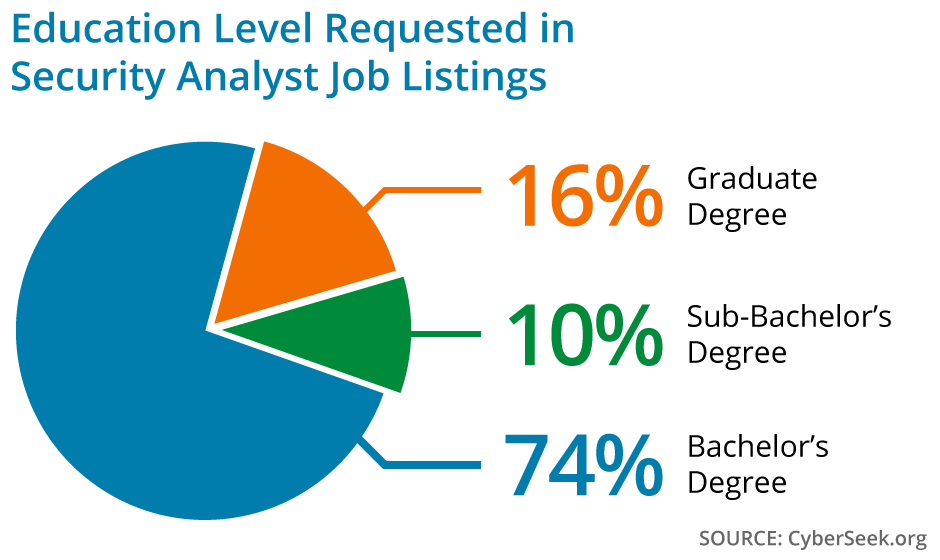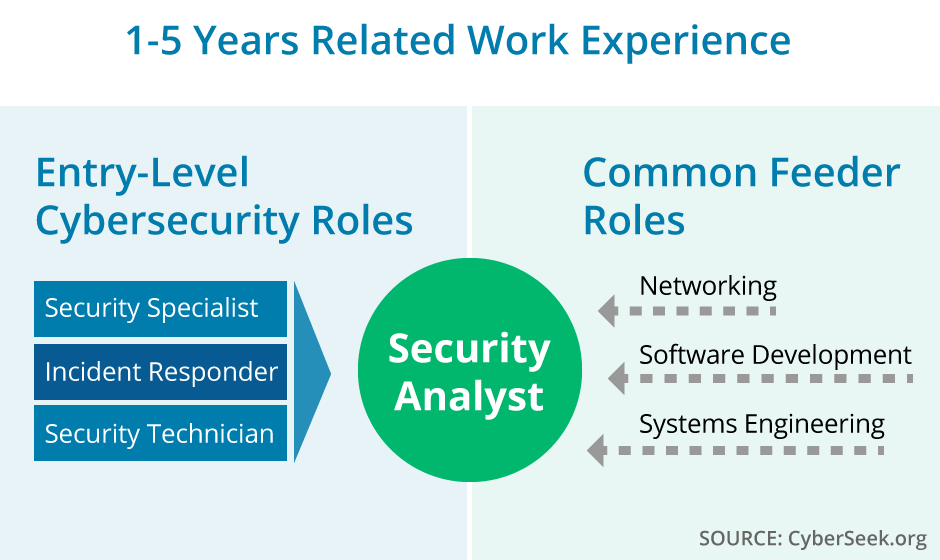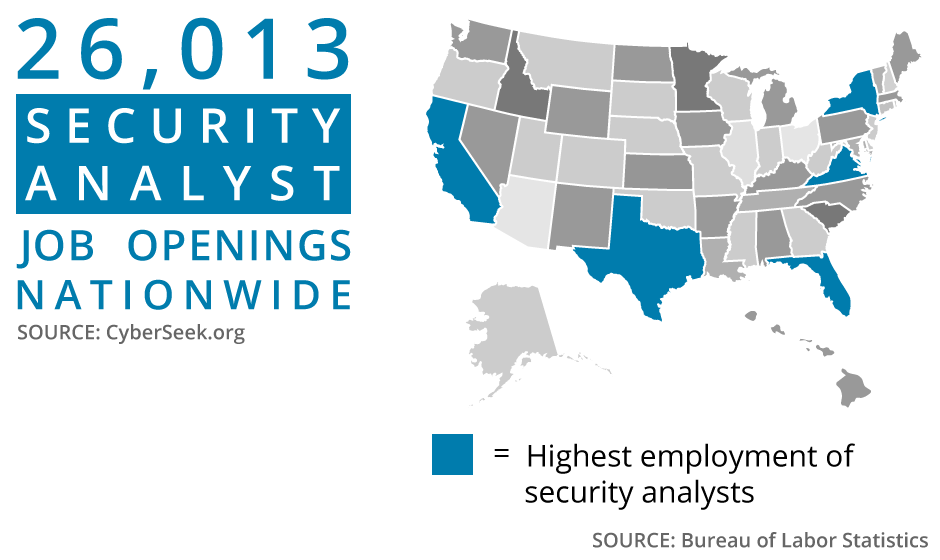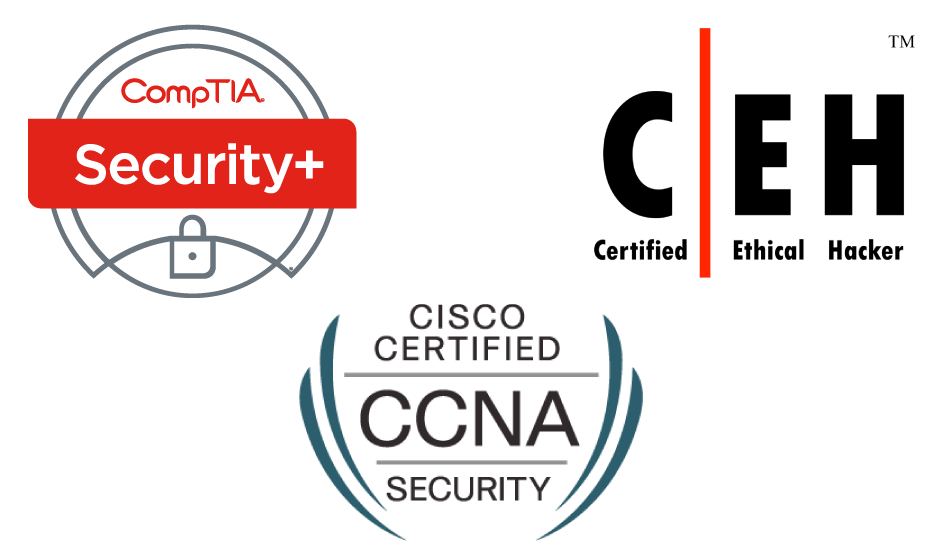What Does a Security Analyst Do?
The security analyst role is fast-paced, and no two days’ work are the same. Security analysts investigate security events and anomalies, analyze risk, and plan, implement, and monitor procedures to mitigate that risk. Security analysts can also be called cybersecurity analysts, information security analysts, incident response analysts, vulnerability analysts, and security risk analysts.
The cybersecurity analyst job description commonly includes tasks like auditing current security protocols, evaluating and improving firewalls and data encryption, and responding to security breaches. The top industries that employ security analysts include banking, data processing, research and development, and enterprise-level corporations.
How Much Does a Security Analyst Make?

According to the Bureau of Labor Statistics, the median security analyst salary was $95,510 in 2017. Professionals at the top of the field earn $153,090 or more, while the lowest salary is $55,560. Security analyst jobs are expected to increase four times faster than the average for all occupations, so you'll have plenty of opportunity for growth.
Security Analyst Responsibilities
- Ensure software and applications are up to date
- Update disaster response strategies and other protocols
- Train staff on new policies and procedures
- Perform risk analysis and vulnerability testing
- Monitor systems for suspicious activity
- Respond to and mitigate security breaches
- Identify the root cause of security breaches
- Audit and verify security of third-party vendors
Career Path for Security Analysts




Most security analyst jobs want you to have a bachelor’s degree in computer science or a related field, like programming. But a degree is only one part of preparing for a career in cybersecurity. You’ll also want to start working on your certifications. Certifications like CompTIA Security+ and CCNA Security will help you learn the skills you need; you can then earn more advanced credentials like Certified Ethical Hacker (CEH) as you move up in the role.
So how long does it take to become a security analyst? While it’s considered an entry- to mid-level job, 1 to 5 years of experience in IT are typically required. You can start as a systems administrator, network administrator, computer systems analyst, or database administrator. You can even start at an IT help desk to begin developing your security analyst skills.
What Should I Know to Become a Security Analyst?
Hard Skills
- Fundamentals of networking and network protocols
- Penetration testing and risk analysis
- Creating and updating intrusion detection systems
- Installing data encryption programs and firewalls
- Identifying suspicious activity in network log records
- Best practices for incident and disaster response
- Industry tools like EMET, Zeek, Wireshark, and FireEye
Soft Skills
- Curiosity and drive to learn new things
- Ability to maintain focus for long periods of time
- Analytical mindset to solve problems
- Organizational skills to maintain records
- Works well in a fast-paced environment
- Ability to collaborate at all organizational levels
- Verbal and written communication skills
Top Certifications for Security Analysts

CompTIA Security+
Learn essential cybersecurity skills and knowledge that you can apply to any hardware and network specifications. CompTIA certifications prepare you to work confidently in most cybersecurity environments. Explore Online Training Options Through: George Mason University University of Georgia University of Texas at Arlington

CCNA: Security
Gain a practical security know-how that you can apply to one of the world’s most trusted hardware providers, Cisco. CCNA certifications are comprehensive and useful regardless of your hardware preferences. Explore Online Training Options Through: George Mason University University of Georgia University of Texas at Arlington

Certified Ethical Hacker (CEH)
The CEH credential shows employers you can use advanced hacking tools and techniques to mimic attacks and understand the steps needed to protect vulnerable systems from similar attacks via hackers, malware, and invasion tools. Explore Online Training Options Through: George Mason University University of Georgia University of Texas at Arlington
Careers Related to Security Analyst
Entry Level
You can gain applicable job experience in a related IT field like network or systems administration. Paired with the right certifications, these jobs could open doors in your security analyst career:
- Network administrator
- Computer systems analyst
- Computer systems administrator
- Database administrator
Senior Level
You can work your way up to a senior security analyst role, and from there, you’ll be a great fit for these cybersecurity jobs:
- Security manager
- Security architect
- Security engineer
- Security consultant
- Forensics expert